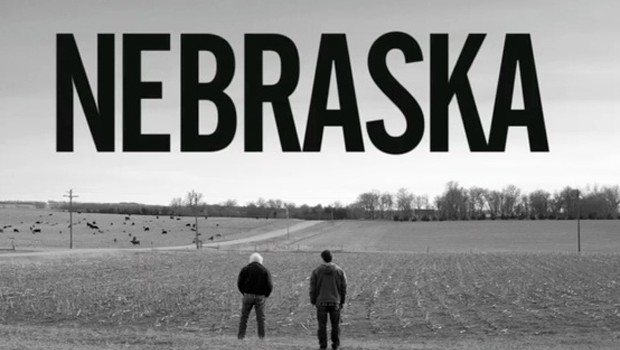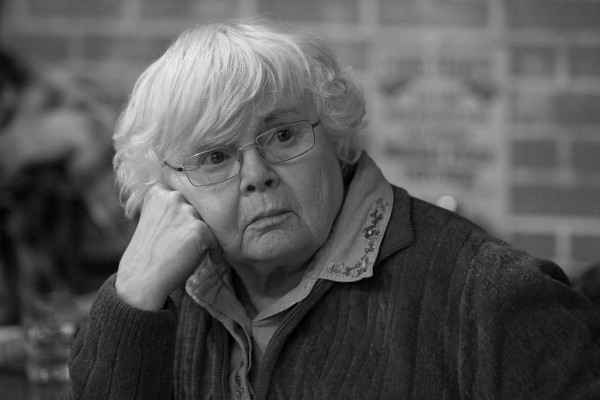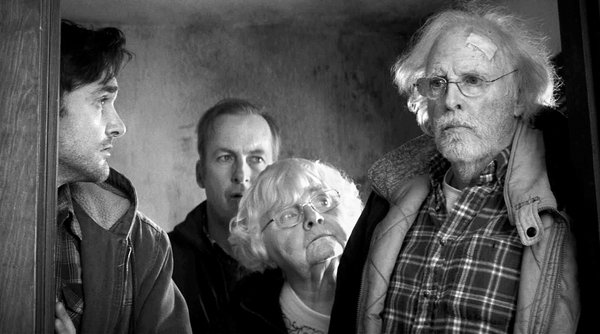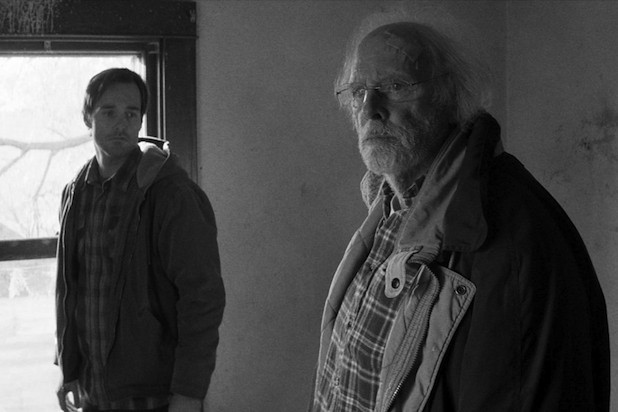Nebraska – Film Review
Reviewed by Damien Straker on February 18th, 2014
Roadshow presents a film by Alexander Payne
Written by Bob Nelson
Starring: Bruce Dern, Will Forte and June Squibb
Running Time: 115 minutes
Rating: M
Release Date: February 20th, 2014
Alexander Payne is one of the best filmmakers in the world. Few directors currently working are as skilful at balancing both comedic and dramatic tones in the same film. With a consistent writing partner in Jim Taylor, they’ve written four features together, he ensures that the screenplay is the forefront of his films. He understands comedy rarely stands alone. It is the magnification of the flaws of ordinary people that provides his films with a dramatic narrative line through even the smallest slice of life stories. He engages with themes concerning infidelity, dysfunctional families, and more broadly the failure of the American Dream. Seemingly tragic, these ideas are viewed through a lens that is highly satirical of American cultural and self-depreciating in its comedic voice.
Payne was born in Nebraska, meaning there’s a personal touch to the look and feel of this film. This is the first film Payne has directed without writing the screenplay himself. He was given first time screenwriter Bob Nelson’s script over a decade ago. He resisted making the film immediately because he did not want to make another road movie in close proximity to About Schmidt and Sideways. It’s not a coincidence that without Payne’s prints on the screenplay that Nebraska is one of his weaker films. This isn’t due to the film’s minimalism. It was made on a budget of just thirteen million dollars. Payne also fought the film studio Paramount Pictures to have it shot in black and white too. It is because the lean story drifts, looking for dramatic and metaphorical significance, without achieving the emotional power of some of Payne’s best and most tragic films.
One of the bonuses of delaying the film though is that the narrative achieves contemporary economic relevancy. Nebraska is a state that is slowly recovering from the Global Financial Crisis. Its strengths are its manufacturing industry and food processing, with cattle being one of the defining financial components of its economy. The housing market is strong but it is not translating into job growth. Agriculture is also costly, with land prices rising by 25% in the last year. Farms that have been passed down between generations are being sold because people can no longer maintain them. This economic uncertainty is translated into the quest of Bruce Dern’s character Woody, a fragile elderly man who is determined to take what he believes is a winning lottery ticket all the way to Nebraska. His wife (June Squibb) thinks he’s mad and is disgusted when their son David (played by former Saturday Night Live comedian Will Forte) decides to go along with Woody’s fantasy so that his father doesn’t end up hurting himself.
True to many of the cold, sparse and empty streets that David and Woody visit, the film seems uneventful and at times insubstantial in its highly linear trajectory. In the first half, there are endless shots of the wide open roads, as though Payne realised he had to fill in the time. The remainder of the film is a highly episodic, cliché father and son bonding story. Payne himself has admittedly labelled it as corny. Woody and David visit several smoky diners, some bars, a cemetery and the house he grew up in. This supports Woody’s backstory, including some bleak family history but it also makes the forward trajectory of the narrative and its dramatic peaks seem stilted. We learn he’s not such a terrible father, much is made of his struggle to say no to people, and then David arranges to unselfishly repay him. Will Forte’s character exists to mirror our emotions of rediscovering his father. Aside from his own relationship breakup, the character of David isn’t as interesting, lacking the vividness of the leading men from Payne’s other films. The desperation of the townsfolk, as they learn of Woody’s fortune, is one of the stories most interesting layers but it’s still treated lightly, without much heat.
Payne still knows how to pitch the comedy at a quiet, deadpan level so that many of the film’s jabs that the characters fire at each other are darkly funny. I especially liked a line where David declares that by the time his father manages to get his driver’s license back he won’t be on the road. The film’s oldest leads in Bruce Dern and June Squibb feature strongly. Bruce Dern transcends visible acting techniques to immerse himself into Woody’s physical and mental frailty as a man who is difficult to connect with. His own mind is quickly failing and no one can tell if he is stubborn or plain mad in his quest but he also displays a previously unknown selflessness. June Squibb injects her scenes with some hilarious verbal sparring. Her character has her own unexpectedly scandalous and colourful personal history. The film isn’t a total misfire. Its sparseness is daring today and it’s funnier than some of the comedies I saw in 2013 but I prefer Payne’s films when they’re tragic and sad too. It’s his signature to express the pain of everyday life that resonates, not just light and quietly funny observational humour.
Summary: It's funnier than some of the comedies I saw in 2013 but I prefer Payne's films when they're tragic and sad too.











